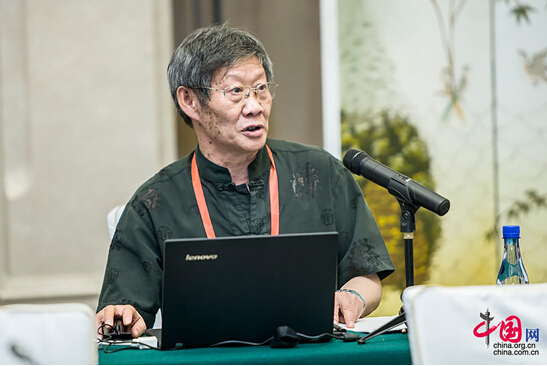China-C. Asia energy cooperation vital to Silk Road
- By Zhang Lulu
 0 Comment(s)
0 Comment(s) Print
Print E-mail China.org.cn, June 30, 2014
E-mail China.org.cn, June 30, 2014
|
|
| He Lunzhi, director of the Institute of Economic Research at Xinjiang University, delivers a speech during the roundtable at the Silk Road Economic Belt International Seminar held in Urumqi, capital city of Xinjiang Uygur Autonomous Region, on Thursday. [Photo/China.org.cn] |
Energy cooperation between China and Central Asia will play a vital role in building the Silk Road Economic Belt, said He Lunzhi, director of the Institute of Economic Research at Xinjiang University, on the sidelines of the Silk Road Economic Belt International Seminar held in Urumqi, capital city of Xinjiang Uygur Autonomous Region, on June 26.
The Silk Road Economic Belt spans the Eurasian continent, including the resource-rich region of Central Asia.
"Fifty to 60 percent of China's oil is imported from other countries, of which 50 to 60 percent is imported from the Middle East via the sea. Thus, maritime security and the volatile society there often compromise the region as a source for oil imports," He said. "If the U.S. intervenes in that region, China's energy security will be jeopardized. Thus, China needs to find an alternative, and that is Central Asia."
If China's economy maintains its current 7-or-so percent economic growth, the country will face a 28 percent gap of energy by 2020. But if Central Asia is secured as a source of energy, 17 percent of China's energy demand will be met by 2020 and almost 28 percent will be met by 2030, He predicted. Currently only 8 to 10 percent of China's oil is imported from Central Asia.
On the suspicion that China intends to exploit the energy resources of Central Asia and may trigger conflicts of the entrenched interests in this region, He said, "Though it concerns other factors like politics, energy is first of all a commodity. It is decided by the market."
China needs to diversify its energy sources, and Central Asia wants to diversify its energy export destinations, which put the two regions in a complementary position, He added.
In the meantime, China needs to carry out some institutional innovations, including legal innovations concerning international trade rules, in order to adapt to the global energy and trade environment, He said.







Go to Forum >>0 Comment(s)